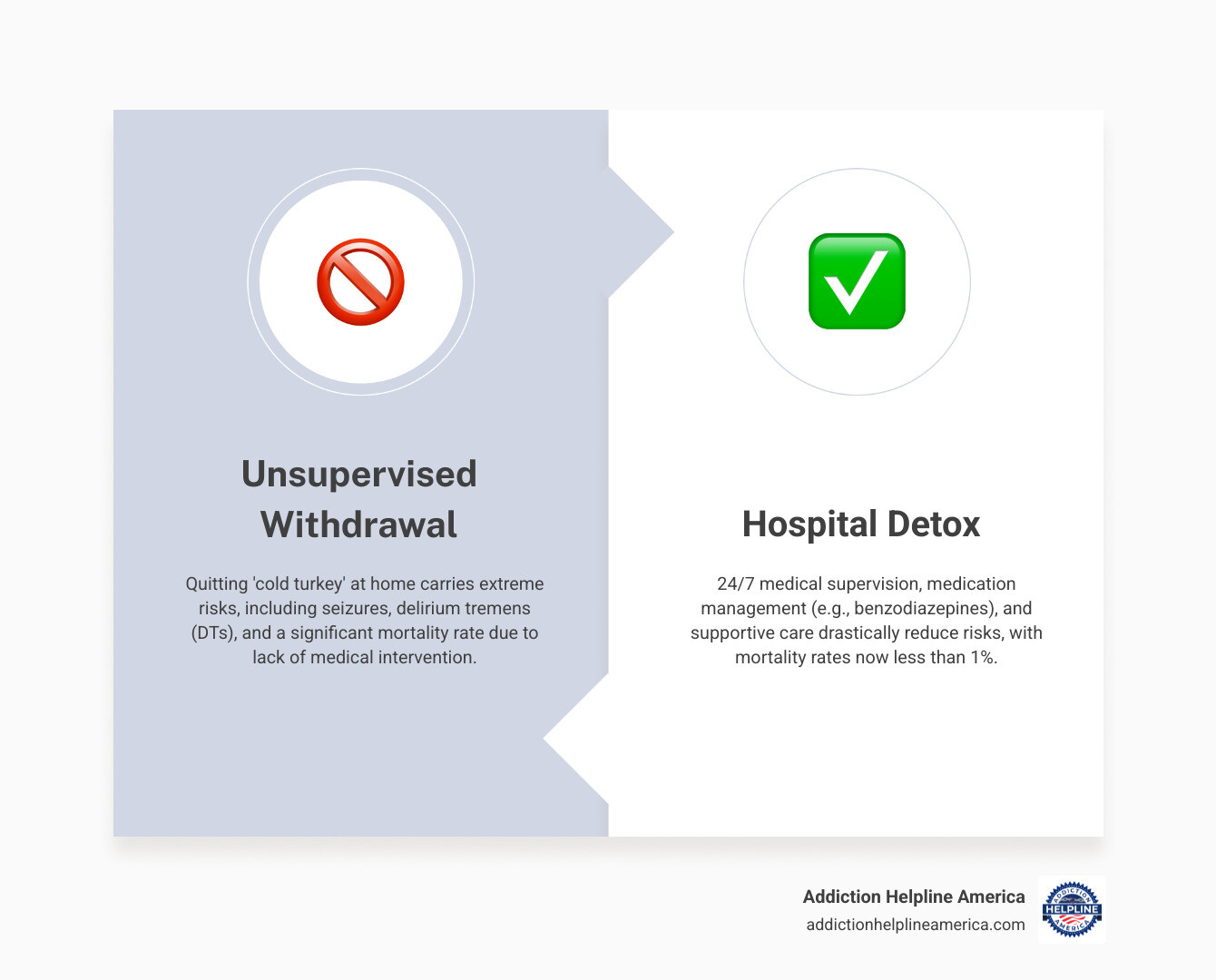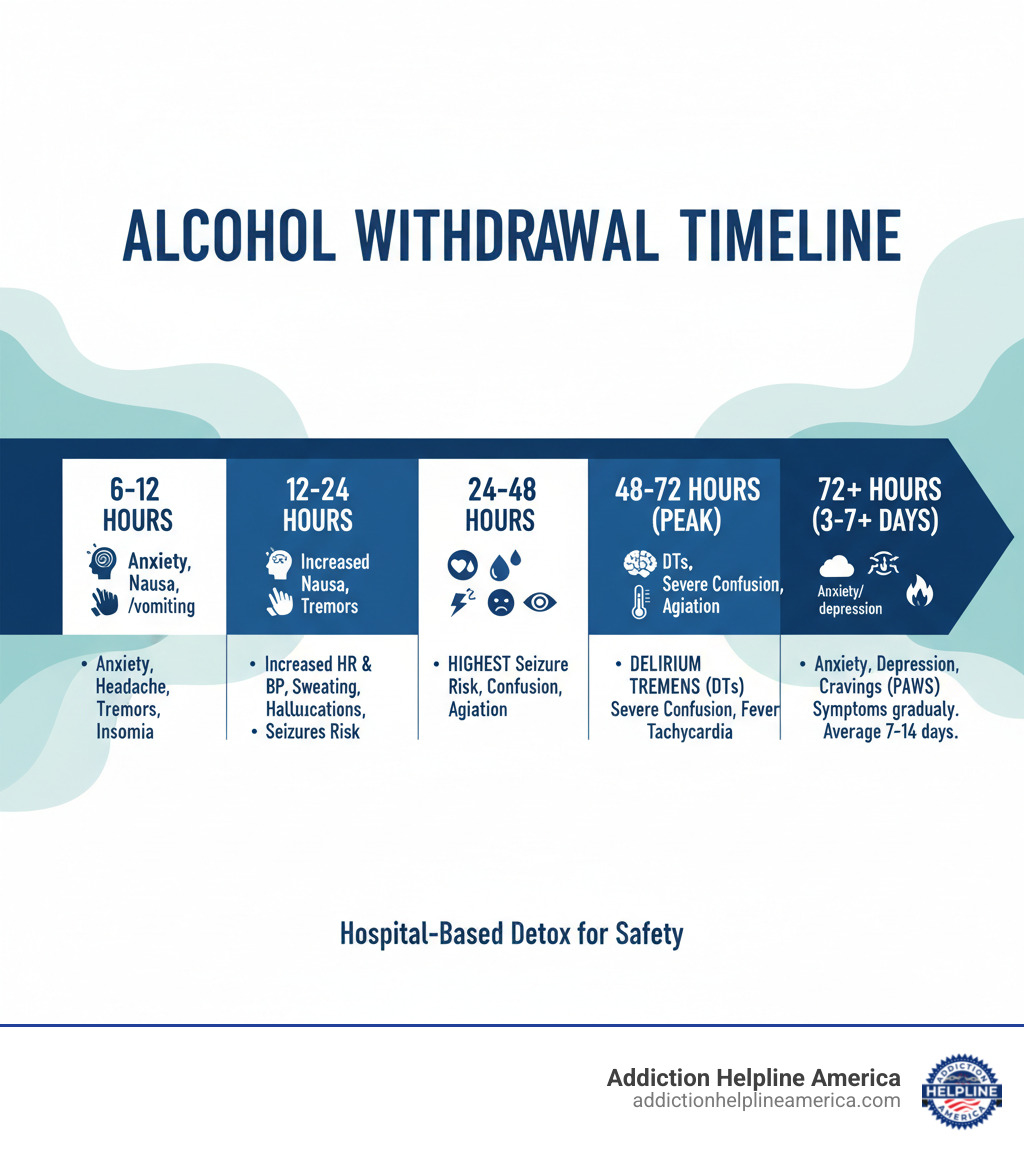
24/7 Free & Confidential Hospital Detox Helpline
Detox in hospital is a medically supervised process where individuals safely withdraw from alcohol under 24/7 professional care. For anyone with sustained heavy alcohol use, it is the safest first step toward recovery. This is because alcohol withdrawal can be life-threatening, with risks including seizures and delirium tremens (DTs). A hospital program, typically lasting 7-14 days, manages these symptoms with medication, monitoring, and support, leading to a medically stable condition.
Approximately 10% of patients entering acute-care hospitals show signs of alcohol withdrawal. Without proper medical management, severe withdrawal historically carried a 15% mortality rate. With modern hospital-based care, this has dropped to less than 1%.
Quitting “cold turkey” at home is dangerous because the central nervous system, adapted to alcohol, goes into hyperactive overdrive when it’s suddenly removed. Hospital detox provides the medical interventions needed to keep you safe during this critical transition.
At Addiction Helpline America, we guide individuals and families through finding appropriate detox in hospital care. We connect you with facilities that provide the medical expertise and compassionate support needed for a safe withdrawal. Our team is here to help you steer every aspect of this courageous first step.
Quick look at detox in hospital:
Why a Hospital Setting is Crucial for Safe Alcohol Detox
When you stop drinking after a period of heavy use, your body can go into a state of shock. Your brain and nervous system have adapted to alcohol’s presence, and its sudden removal can be dangerous. This is why a detox in hospital setting is often life-saving.
The medical term for this is Alcohol Withdrawal Syndrome (AWS), which can range from mild shakes to life-threatening complications. Without professional supervision, patients face higher risks of serious medical issues, longer hospital stays, and increased mortality. The stakes are high, which is why medical oversight is so important.
Understanding the Dangers of Alcohol Withdrawal
Alcohol is a depressant. To compensate, your brain chemistry adjusts. When alcohol is removed, your central nervous system becomes hyperactive. This can be deadly.
A key concern is the “kindling effect”: each withdrawal episode can be more severe than the last. If you’ve detoxed and relapsed before, your next attempt will likely be more dangerous.
The most serious complication is Delirium Tremens (DTs), affecting 3-5% of people in withdrawal, typically 48-96 hours after the last drink. DTs involve severe confusion, fever, hallucinations, and a racing heart. Without immediate medical care, DTs can be fatal. Seizures are another major risk, usually occurring within the first 48 hours.
Statistics show that about 20% of adults admitted to hospitals engage in risky alcohol use, and of these, 77% are alcohol dependent. Historically, severe withdrawal had a 15% mortality rate. With modern hospital care following protocols like those in The ASAM Clinical Practice Guideline on Alcohol Withdrawal Management, that rate is now less than 1%.
The Benefits of Hospital-Based Detox vs. Other Settings
A detox in hospital is safer for several key reasons:
- Round-the-clock medical supervision: A medical team is always present to respond to emergencies like seizures or DTs, especially during the night when symptoms often spike.
- Management of co-occurring health issues: Hospitals are equipped to manage other health problems like diabetes, heart disease, or mental health conditions alongside detox, preventing dangerous complications.
- Access to a full range of medical experts: You have access to addiction specialists, neurologists, psychiatrists, and nutritionists, ensuring all aspects of your health are addressed.
- A structured, controlled environment: Being removed from daily triggers and access to alcohol significantly reduces the risk of relapse before detox is complete.
- Personalized care: Your treatment plan is custom to your specific drinking history, health status, and risk factors, ensuring the safest possible detox.
At Addiction Helpline America, we help you find various detox places that provide the necessary medical supervision. For anyone with moderate to severe alcohol dependence, a hospital setting provides a crucial safety net.
The Process of Detox in Hospital: What to Expect
Choosing a detox in hospital can be daunting. Knowing what to expect can ease anxiety. While every journey is unique, the process follows a proven path designed for safety and support. Most programs last 7-14 days, depending on your specific needs.
Upon arrival, you’ll go through an admission process where staff gather information about your drinking history and overall health. Your daily routine will be structured with regular medical check-ins, meals, and rest in a calm, supportive environment.
The Three Stages of Hospital Detox
Hospital detox is a planned process that unfolds in three stages:
- Evaluation: The medical team conducts a thorough assessment to create your individualized treatment plan. This includes reviewing your medical history and using screening tools like the AUDIT-C questionnaire to predict withdrawal severity.
- Stabilization: This is the core of detox, where your body withdraws from alcohol. The team monitors you 24/7, using medication to ease symptoms and prevent complications. Supportive care, including hydration and nutrition, is provided in a calm environment to help you rest and heal.
- Fostering Entry into Treatment: Detox is just the beginning. As you stabilize, the focus shifts to your long-term recovery. Your care team helps create a discharge plan, connecting you with resources like inpatient rehab, outpatient programs, or support groups.
A Typical Alcohol Withdrawal Timeline
While experiences vary, withdrawal often follows a predictable pattern:
- 6-12 hours: Early symptoms appear, including anxiety, nausea, headaches, and tremors.
- 12-48 hours: Symptoms can intensify. You may experience a racing heart, high blood pressure, and sometimes hallucinations. The risk of seizures is highest during this period, making medical monitoring critical.
- 48-72 hours: Symptoms typically peak. This is when the most serious complication, Delirium Tremens (DTs), is most likely to occur. DTs are a medical emergency characterized by severe confusion, fever, and agitation.
- After 72 hours: Acute physical symptoms usually begin to ease. However, psychological symptoms like anxiety and insomnia can linger, a condition known as Post-Acute Withdrawal Syndrome (PAWS).
Common Withdrawal Symptoms and Their Management
During your stay, the medical team will manage a range of symptoms:
- Physical Symptoms: Tremors, sweating, nausea, vomiting, headaches, and increased heart rate and blood pressure are common. The most dangerous is seizures, which require immediate emergency intervention.
- Psychological Symptoms: Anxiety, agitation, insomnia, confusion, and irritability can be just as challenging as physical symptoms.
Management involves creating a calm, quiet environment and ensuring proper hydration and nutrition. Replenishing depleted vitamins, especially thiamine and folic acid, is crucial for preventing serious brain disorders. Medications are also central to a safe and comfortable detox, as detailed in resources like the Detoxification and Substance Abuse Treatment guide.
Throughout this process, the nursing staff provides constant monitoring and emotional support. At Addiction Helpline America, we connect people to programs where this comprehensive care is standard.
Medical and Psychological Support During Your Stay
Going through detox in hospital means you are supported by a team of professionals who care for your body and mind. Many people needing alcohol detox also have co-occurring mental health conditions like depression or anxiety (a dual diagnosis). A hospital is uniquely equipped to provide integrated treatment, addressing both issues simultaneously for better outcomes. This holistic approach sets you up for lasting recovery. You can explore resources like our CC Detox services for more on this model.
The Role of the Medical Team in a detox in hospital
Your detox team works together to keep you safe and comfortable:
- Doctors oversee your care, manage medications, and respond to any complications.
- Nurses are your frontline support. They monitor your vital signs and symptoms using tools like the CIWA-Ar scale, administer medications, and provide comfort and reassurance.
- Therapists and Counselors offer emotional support and begin introducing you to recovery concepts and coping skills as you stabilize.
- Case Managers act as bridge builders, coordinating your discharge plan and connecting you with the next level of care, such as rehab or outpatient programs.
This multidisciplinary approach ensures every aspect of your health is addressed.
Medications Used for a Safe detox in hospital
Medications are used to calm your overactive nervous system and prevent dangerous complications.
- Benzodiazepines (e.g., Lorazepam, Diazepam) are the primary treatment. They reduce anxiety, stop tremors, and prevent seizures. Doses are carefully tapered down as you stabilize.
- Anticonvulsants (e.g., Gabapentin) provide an additional layer of protection against seizures and can help with anxiety and sleep.
- Beta-blockers and Alpha-adrenergic agonists (e.g., Atenolol, Clonidine) help manage physical symptoms like a racing heart and high blood pressure.
- Nutritional Support is critical. You’ll receive Thiamine (Vitamin B1), Folic Acid, and multivitamins to replenish what alcohol has depleted. Thiamine is essential to prevent Wernicke-Korsakoff syndrome, a serious brain disorder. It must be given before any glucose to be effective.
Every medication decision is based on your individual needs to make withdrawal as safe and comfortable as possible. This medication-assisted approach, detailed in resources like the Research on the Treatment of Alcohol Withdrawal, dramatically reduces the risks of detox.
Life After Hospital Detox: The Next Steps in Recovery
Finishing your detox in hospital is a major accomplishment. However, detox only addresses the physical dependence on alcohol. The real work of recovery—learning new coping skills and healing the underlying reasons for drinking—begins after you leave. Relapse prevention planning and continued care are essential for long-term success.
Transitioning to Ongoing Treatment
Before discharge, your case manager will help create a personalized aftercare plan. Your options depend on your addiction severity, mental health, and home environment.
- Inpatient Rehabilitation: For those with severe dependence or dual diagnosis, these residential programs offer a structured, trigger-free environment for intensive therapy and 24/7 support.
- Outpatient Programs: If you have a strong support system, outpatient care allows you to live at home while attending treatment. Options range from intensive day programs (PHP and IOP) to standard weekly therapy sessions.
- Sober Living Environments: These are drug- and alcohol-free homes where you live with peers in recovery, providing accountability and a safe space to practice sober living skills.
Figuring out the right next step can be confusing. Our team at Addiction Helpline America can help you understand your options. Our Detox Program Near Me Guide offers more information on different treatment levels.
Building a Foundation for Long-Term Sobriety
Staying sober involves building a new foundation for your life. Key components include:
- Individual Therapy: Therapies like Cognitive Behavioral Therapy (CBT) help you change the thought patterns that lead to drinking. Other therapies can address underlying trauma, depression, or anxiety.
- Family Counseling: Addiction harms relationships. Family therapy provides a safe space to heal wounds, improve communication, and teach loved ones how to support your recovery.
- Support Groups: Connecting with peers who understand your struggle is powerful. Alcoholics Anonymous (AA), SMART Recovery, and LifeRing are popular options that provide community and accountability. The Finding and Getting Help for Alcohol Problems guide offers more resources.
- Healthy Habits: Regular exercise, a balanced diet, and mindfulness practices like meditation are practical tools that improve mood and help manage stress and cravings.
- Relapse Prevention Planning: Work with a therapist to identify your personal triggers and warning signs, and create a concrete plan for how to handle them.
Recovery is a journey, not a destination. At Addiction Helpline America, we’re here to help you find the types of treatment programs that will support you at every stage.
Frequently Asked Questions about Detox in Hospital
Deciding to seek help brings up many practical questions. Here are clear, honest answers to some common concerns.
How long does hospital detox usually last?
The typical stay for detox in hospital is 7 to 14 days. However, the exact length depends on you. Factors that can influence your stay include the severity and length of your alcohol use, your overall physical health, and whether you have any co-occurring mental health conditions. The medical team will monitor you closely and will not discharge you until you are medically stable and have a solid plan for the next step in your recovery.
Is hospital detox covered by insurance?
Yes, most insurance plans, including PPO and HMO policies, cover hospital detox services. However, the extent of coverage, deductibles, and out-of-pocket costs vary significantly between plans. Understanding your specific policy can be confusing, especially during a stressful time.
At Addiction Helpline America, we offer free, confidential insurance verification. We will contact your provider to determine your coverage for detox, medications, and therapy, and explain it to you in simple terms. Don’t let uncertainty about cost prevent you from seeking help. We can handle the insurance headaches for you.
What happens if I have a co-occurring mental health condition?
It is very common for alcohol addiction to occur alongside a mental health condition like depression, anxiety, or PTSD. This is known as a dual diagnosis. A detox in hospital is one of the best settings for this situation because it is equipped to provide integrated treatment.
Your initial evaluation will assess both your physical and mental health. Your treatment plan will be designed to address both conditions simultaneously, with doctors, psychiatrists, and therapists working as a coordinated team. Treating addiction and mental health together is crucial for preventing relapse and building a strong foundation for lasting recovery.
Conclusion
Taking the first step toward recovery from alcohol addiction takes courage. Choosing a detox in hospital is the safest way to begin healing, offering 24/7 medical supervision to manage the serious risks of alcohol withdrawal. In a hospital, a dedicated team of doctors, nurses, and therapists works to stabilize your health and prepare you for a life beyond addiction.
Detox in hospital is the beginning, not the end. It clears the alcohol from your system, but the real work of recovery happens through ongoing treatment. Transitioning to a program like inpatient rehab, outpatient therapy, or a support group is essential for building a sober, fulfilling life.
At Addiction Helpline America, we have guided thousands of people through this process. Our nationwide network connects you with quality treatment facilities, and we provide free, confidential guidance to make finding help easier. We can answer your questions, verify your insurance, and match you with a program that fits your needs.
You don’t have to do this alone. Whether for yourself or a loved one, we are ready to help you take the next step. Find the right types of treatment programs for your journey to recovery and let us guide you today.
Our helpline is 100%
free & confidential
If you or someone you care about is struggling with drug or alcohol addiction, we can help you explore your recovery options. Don’t face this challenge alone—seek support from us.
Programs
Resources
Will my insurance
cover addiction
treatment?
We're ready to help
Find the best
drug or alcohol treatment
center
Are you or a loved one struggling with addiction? Call today to speak to a treatment expert.

















